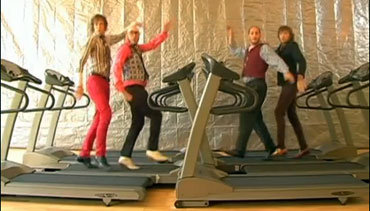Interview: OK Go on the Rebirth of the Music Video Page 3

From a historical perspective, it's only relatively recently that music has been fixed to a physical form.
Exactly. That it is fixed to a physical form is already a strange twist of fate. But that a physical form is the only way we should be able to think about it, and that [sales] became so codified as the basic unit of measuring success, is a really ass-backward system. I mean, I buy into it as much as the next guy - I remember the first record I bought - so it's an effective system on some level, but it's not one that really connects all that well to the human engagement with, and connection to, music. The fact is that the system has more or less collapsed. Music in general is doing pretty well; go on the subway and see how many people are listening to music all day long. See how many people have headphones in their ears, and how much music is being passed around, and how many great and weird wonderful ideas are popping up because of digital distribution and because the system isn't in the way anymore. Music is alive and well; record sales are the only thing that really have tanked.
Think about it from the perspective of a guy in a band like me. I don't know anyone in my band, or in my fan base, my family, or group of friends who know or care how many records we sold last week, or who know or care how many radio stations played a certain song, or how the alternative rock station in some tertiary Midwestern town happens to be a bellwether for the rest of the cumulative stations. Those are the metrics that the music industry is still using, but they don't have anything to do with our connection to music. Those metrics are supposed to be gauges of desire, but they're actually only gauges of how well-oiled the machine is, in that particular part of the machine.
Frankly, none of the metrics used are related to reality anymore. I would argue in my pretentious and high-falutin' way that those metrics were always pretty broken. We've based our whole industrial understanding of music on record sales, and when you really get down to it, it doesn't mean shit. In 1920, what did record sales mean? Music was alive and well. You certainly wouldn't have judged Mozart on sales of his scores. What was Mozart doing? Was he writing for posterity because he knew that some day there would be recordings that could be passed around? I doubt it. The music is the music, and it doesn't have that much to do with the sale of CDs.
- Log in or register to post comments



































































